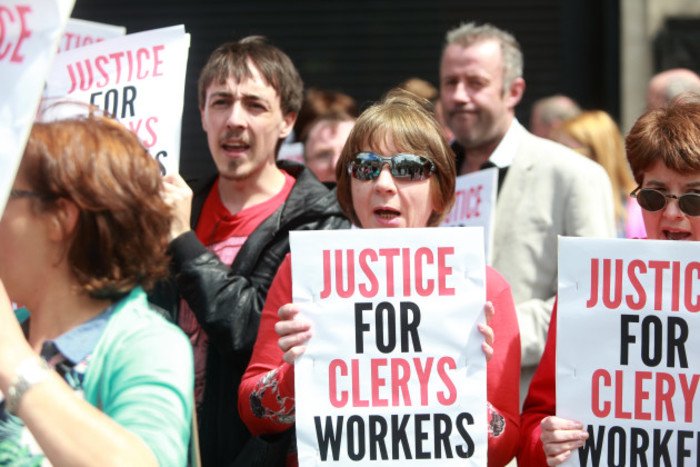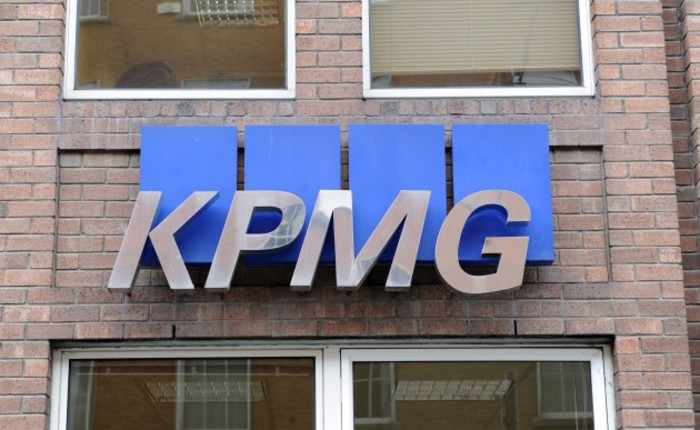A quarter of the cash from Clerys' liquidation has gone to accountants and lawyers
The state was forced to pick up the €2 million tab for sacked workers’ redundancy entitlements.
LAWYERS AND ACCOUNTANTS have received almost half a million euro in fees as part of the liquidation of iconic department store Clerys.
However, the store’s former employees, who were left jobless when the store suddenly closed, have received no money from the wind-up besides their statutory entitlements – for which taxpayers have picked up the tab.
About 130 direct employees and another 330 who sold their wares in the department store through concessions lost their jobs when Clerys was suddenly declared insolvent in June 2015.
The subsequent liquidation has become infamous due to the cold treatment of the staff, many of whom had worked at the store for decades.
Clerys’ previous owners, US investment firm Gordon Brothers Group, sold the store to a joint venture called Natrium made up of Irish investment group D2 Private and UK-based Cheyne Capital Management.
Before it was sold, the Clerys business was split into two main companies – one in charge of its day-to-day retail operations and a second that oversaw the firm’s assets, including the prime O’Connell St site where the store was housed.
The loss-making trading business, OCS Operations, changed hands for a notional €1 in July and was quickly liquidated, while the property firm, OSC Properties, was sold for €29 million and continued to trade.
Neither the old nor the new owners of the store provided staff with redundancy pay, and in the end the state was forced to pick up a €2 million redundancy bill.
 Former Clerys workers
Former Clerys workers
Liquidators fees
A new liquidators’ report for OCS Operations shows that the company had assets of about €2.2 million after the business stopped trading and all of its assets were sold.
Some €485,000 of this was made up of redundancy cash that the state paid to the liquidators, who then distributed it to former employees.
Stripping out this amount, about €1.7 million was left in the control of the liquidators, Kieran Wallace and Eamonn Richardson of KPMG, in June 2015. Around €200,000 in extra cash came from Revenue, for a VAT refund, and Dublin City Council, for a rates refund.

Out of the total €1.9 million cash pool, accountants KPMG and lawyers McCann Fitzgerald have received a combined total of just under €470,000.
Another €654,000 was paid out to concession owners, who at the time of the closure claimed they were owed around €2 million.
The latest documents filed with the companies office show KPMG received €246,000 in liquidators’ fees in September.
‘Conflict of interest’
Shortly after Clerys was sold, Sinn Féin leader Gerry Adams told the Dáil there were “serious conflicts of interest” surrounding the sale of the business.
KPMG, as well as being the Clerys liquidators, has also worked for companies associated with D2 Private, which was part of the consortium that bought the store.
Deirdre Foley, the head of D2 Private, began her career with KPMG in 1992, where she trained as an accountant. KPMG declined to comment when contacted by Fora.
 D2 Private owner Deirdre Foley
D2 Private owner Deirdre Foley
The OCS Operations liquidators have also paid out more than €222,000 to McCann Fitzgerald.
The Irish Times reported in June 2015 that lawyers representing some former concession holders wrote to McCann Fitzgerald, which represented the OCS liquidators, to clarify potential conflicts of interest around KPMG’s role in the sale of Clerys.
The OCS Operations liquidators still have €352,756 left to distribute after making several other payments, including €151,396 on “IT, utilities, security & others” and €12,796 on “professional fees”.
The report noted that “ongoing issues including legal proceedings” will probably result in the full winding up of the company taking between 12 and 24 months.






